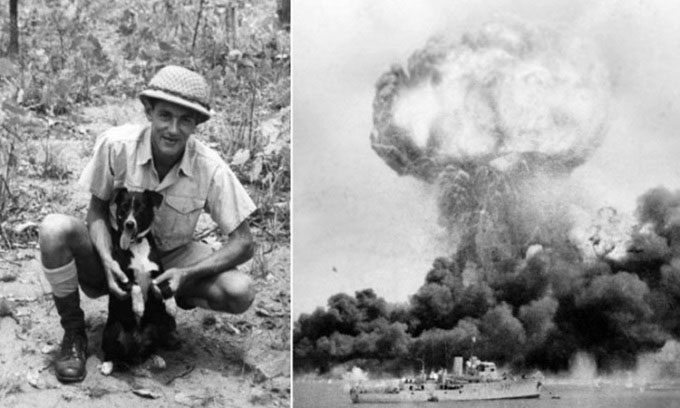With its keen sense of hearing, a dog named Gunner detected Japanese aircraft from a distance of over 160 kilometers, helping the Australian Air Force protect the city of Darwin.
Throughout history, dogs have held a unique position in warfare, serving in various roles such as tracking enemy troops, detecting weapons and explosives, patrolling, or delivering messages. They have even been known to detect distant bombing raids thanks to their acute hearing, as was the case with Gunner, according to Amusing Planet.

Percy Westcott and Gunner in the left photo. (Photo: Amusing Planet)
On February 19, 1942, the city of Darwin in the Northern Territory of Australia became a target for air raids by the Japanese Air Force. Japanese pilots aimed at ships docked in Darwin Harbor and the Royal Australian Air Force base, attempting to hinder Allied forces from using the base and obstruct the invasion of Timor and Java during World War II. The aftermath of the devastation left behind was the wreckage of a light bomber and a frightened black-and-white kelpie dog with a broken leg.
Airman Percy Westcott discovered the dog beneath the ruins of a hut at the airbase. Westcott rescued the dog and took it to a field hospital. There, the medical staff insisted they could not treat a patient without a name or identification number. Westcott and his friends quickly completed the registration process and named the dog Gunner. This allowed the doctors to examine and bandage its leg. Within a few days, Gunner was happily limping around the camp.
Gunner quickly revealed its keen sense of hearing. It could hear the sound of the chef’s knife hitting steel as they prepared to cut meat. Most impressively, it could detect the sound of approaching aircraft from over 160 kilometers away. The Japanese continued to return to Darwin regularly. Each time before an air raid, Westcott and his friends noticed Gunner becoming agitated, starting to whine and jump around. At that time, radar technology was still rudimentary. Gunner’s alerts often preceded official warnings by as much as 20 minutes, enough time to scramble defensive fighter planes.
Gunner’s hearing was so precise that it could distinguish between the sounds of engines from Allied and Japanese aircraft and would only become agitated when enemy planes approached. Gunner was so reliable that military commanders provided Westcott with a mobile air raid siren to relay Gunner’s warnings to the base. There were only two occasions when Gunner failed to alert in time, as the enemy quickly returned after a previous attack.
Gunner became an indispensable member of the air force. It slept under Westcott’s bed, bathed with the soldiers, sat with them at outdoor movie screenings, and accompanied pilots during takeoff and landing training. Fifteen months later, Westcott was transferred south while Gunner remained in Darwin. No one knows what happened to it thereafter. “I never found out what ultimately happened to him,” Westcott said. “I thought I would return after the war or run into someone who knew, but I couldn’t.”


















































